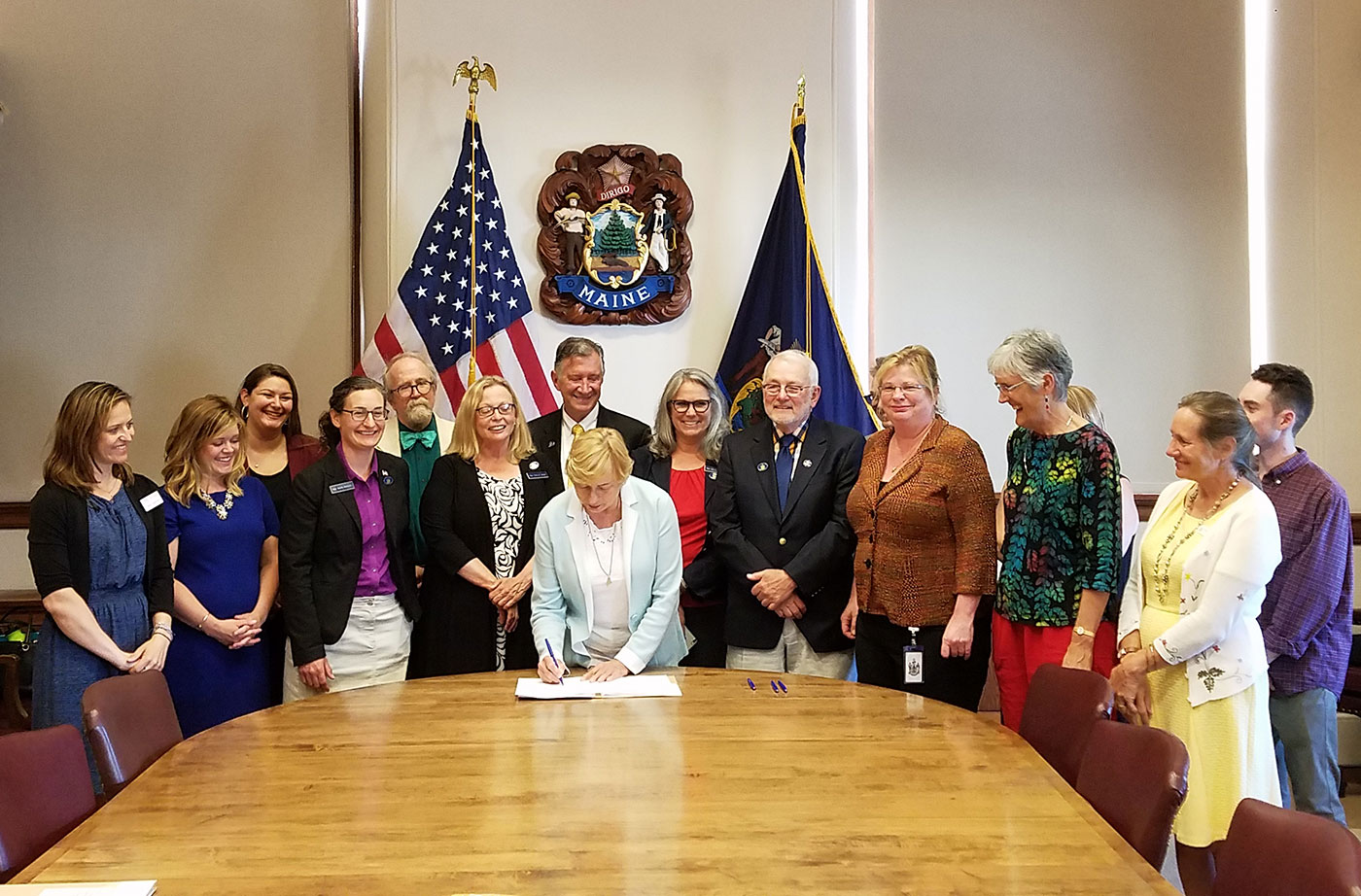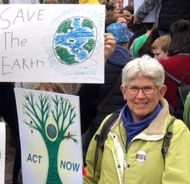
Governor Janet Mills signs a bill into law banning all single-use plastic bags beginning in 2021.
In 2019, with Governor Janet Mills’ signature, Maine became the third state in the nation to ban single-use plastic bags. The plastic bag ban came to fruition shortly after the passage of a neighboring bill that made our state the first in the nation to ban polystyrene foam food containers. The bill was a collaborative effort among conservationists, grocers, and retailers who teamed up with Representative Holly Stover (D-Boothbay) to draft a statewide approach for reducing pollution caused by single-use plastic bags and promoting reusable shopping bags.
Plastic pollution has ubiquitously infiltrated the environment, and unfortunately Maine is no exception. Plastic pollutes our waterways, coastlines, forests, and open spaces. It can also choke wildlife when it is mistaken for food. Research from health and environmental experts continues to affirm these negative impacts, which include posing a threat to human health as plastic is ingested by animals and toxins make their way up the food chain. Since plastic takes thousands of years to decay, the plastic problem will not just fix itself; it requires meaningful action.
Maine’s single-use plastic bags are wasteful and costly, and cause both environmental concerns and financial inefficiencies. Plastic bags are not recyclable—in fact, they can jam recycling equipment. Plastic bag contamination can also result in whole parcels of recycling being deemed unrecyclable and discarded. When plastic bags are mistakenly placed in recycling bins, they can escape and cause pollution.
After several delays related to the COVID-19 pandemic, enforcement of Maine’s plastic bag law went into effect on July 1, 2021. It includes the following:
- Prohibits the distribution of plastic shopping bags at the point of sale at all retail establishments in Maine.
- Places a minimum five-cent fee on paper bags available at the point of sale at large retailers that sell food, to provide an incentive for shoppers to use reusable bags.
- Requires paper bags be made of recycled content and ensures that they are recyclable.
- Excuses participants in SNAP and WIC programs from paying the paper bag fee.
The Natural Resources Council of Maine (NRCM), alongside the Retail Association of Maine (RAM) and the Maine Grocers & Food Producers Association (MGFPA), worked with and listened to Mainers whose vision for a more sustainable bagging system gave rise to the bill. Support for the ban on single-use plastic bags was found on both sides of the consumer-retailer coin. Such widespread advocacy for a more environmentally conscious bagging system reflects Maine’s prospective legislative lens, as Maine continues to lead nationwide in efforts to reduce the effects of pollution.
 “I’m proud of my town, York, Maine, for being the first in the state to pass a municipal plastic carry-out bag ban in 2015. I’m equally proud of our state for taking action to reduce the amount of unnecessary plastics by passing plastic bag and polystyrene container bans. Addressing the plastic pollution crisis is key to promoting a healthy environment for all living beings.” —Victoria Simon
“I’m proud of my town, York, Maine, for being the first in the state to pass a municipal plastic carry-out bag ban in 2015. I’m equally proud of our state for taking action to reduce the amount of unnecessary plastics by passing plastic bag and polystyrene container bans. Addressing the plastic pollution crisis is key to promoting a healthy environment for all living beings.” —Victoria Simon
Maine’s Ban on Single-use Plastic Shopping Bags:
- Went into effect: April 22, 2020 (Earth Day)* Please note that the effective date of Maine’s ban on single-use plastic bags was delayed until July 1, 2021, as part of a package of measures to respond to COVID-19.
- Applies to: All grocery stores, retail stores, restaurants, and any seasonal or temporary stores or markets. No retail establishment may distribute a single-use plastic shopping bag.
- Retail Establishments May:
- provide a recyclable paper bag or reusable plastic bag for a minimum of five cents. BUT large paper bags must contain a minimum of 20% post-consumer recycled content.
- continue to provide plastic produce bags. Plastic bags may also still be used to wrap newspapers, dry cleaning, or tires. BUT stores that provide exempted single-use plastic bags must offer recycling stations within 20 feet of the store’s entrance and must make sure that those products are in fact recycled.
- still sell plastic trash bags for people to use at home.
- Exemption: Restaurants and small local community shops that do not sell food will not have to charge a fee for a paper or reusable plastic bag.
- Pre-empts All Local Ordinances that Regulate Plastic Shopping Bags On the effective date all impacted businesses in Maine began having to follow the state law only. The new law is stronger than any local ordinance that had been adopted to date.










